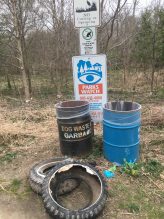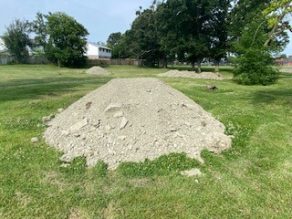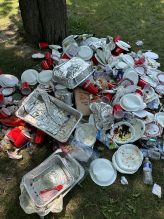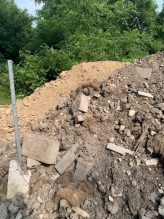Illegal dumping: Your trash isn’t always someone else’s treasure
Illegal dumping is a growing problem in many parts of Mississauga, costing the City thousands of dollars in clean up costs.
Environment | September 3, 2024
What do tires, paint cans, furniture, construction materials, yard waste and propane tanks have in common? They top the chart as the most frequently illegally dumped items across Mississauga – in places like parks, trails and green spaces.
Illegal dumping is when someone drops their unwanted items in public spaces instead of properly disposing of (or recycling) them. Dumping waste on City or private property without permission is illegal. It damages our natural environment, is costly to remove, poses a risk to public safety and is harmful to wildlife and human health.
Beyond the environmental impact, it burdens the City with significant financial costs for cleanup efforts and operations, tallying up to more than $100,000 annually.
Examples of illegal dumping
As you walk around the City, you are likely to see used furniture, filing cabinets, household waste, broken kitchen and bathroom fixtures, discarded wood pieces and car parts like tires and mufflers scattered about, found abandoned in parks or along roadways and sidewalks.
In Mississauga, construction, and renovation materials such as concrete, asphalt, drywall, tiles, paint cans and baseboards are commonly dumped on City property.
There are also examples of residents dumping motor oil, cooking oils, cleaning products, solvents and pharmaceuticals into the City’s storm drains (the square grates on the side of City streets) which contaminate the stormwater system and Lake Ontario.
Why illegal dumping happens
Those engaging in illegal dumping do so mostly for convenience. It’s easier to dump something in a nearby park or parking lot than wait for the weekly garbage pickup or make arrangements to properly dispose of it. Many people who illegal dump assume that the City will take care of it, not realizing how expensive and labour intensive it can be. They’d rather choose convenience than pay the extra expense to have it properly removed by a waste disposal company or take it to one of the Community Recycling Centres.But it doesn’t stop there.
There are individuals who discreetly try concealing their discarded items behind trees, dumpsters, within bushes, hoping to avoid detection. They don’t see it as an issue and don’t care about the impact their actions have on the community or City resources. In some cases, illegal dumping has encouraged others to add their own waste, adding to the pile of unwanted items – so the waste keeps piling up quickly adding to the problem.
Where items being illegally dumped
According to the City’s Parks team, some parks with the most frequent cases of illegal dumping include Carolyn Creek, Willowcreek Park, Fletcher’s Flats, Silverthorn Park and Woodgreen. Picnic areas with the most cases of illegal dumping are Jack Darling Memorial Park, Lakeside Park, Mississauga Valley, Paul Coffey Park and Meadowvale Sports Park.
Illegal dumping by the numbers
In 2024, Mississauga’s 311 call centre has received more than 299 reports of illegal dumping, an increase from 2023. So far, this year, the City has issued two fines for illegal dumping. Both of these fines were from businesses. Most complaints lack witnesses, making it challenging to issue fines.
According to Debris and Anti-Littering By-Law 219-85, those caught illegally dumping on City property can face fines ranging from $500 to $100,000.To address this, the City is focusing on preventing illegal dumping and educating residents on where they can dispose of waste properly.
The City’s Parks division has noted a significant uptick in illegal dumping activity, with an increased amount of time and resources dedicated to the cleanup of discarded items. To date, 1,080 metric tonnes of materials from Mississauga parks have been removed at a of cost $88,000. The City is currently dealing with a specific issue at King’s Park where approximately 1,596 metric tonnes of materials has been dumped with an estimated removal cost of more than $100,000.
How can you help?
While illegal dumping comes down to certain individuals and companies making poor choices, there are steps we all can take to keep our city clean.
Practice the Circular Economy model
Ontario’s landfills are rapidly filling up with items that could have been recycled or reused. The next time you are looking to get rid of something, consider reuse either by selling, donating, giving to friends or family or offering for free pick-up.
By practicing the circular economy approach, you can help reduce landfill waste by using items for as long as possible by repairing, refurbishing, or repurposing them to create a system where nothing is wasted.
Know where to dump your junk
The City is urging residents to avoid littering and illegal dumping. Everyone has a role to play in keeping Mississauga clean and litter-free. Learn how to sort your waste correctly.
Remember:
- When visiting a park, make sure to use waste containers or take waste home if the containers are full or if your waste is too large to fit (e.g. large bags or boxes, broken lawn chairs/umbrellas etc.)
- If you’re not sure how to dispose of your waste properly, Peel Region’s waste management can provide more information.
- If you see garbage and debris left in a park, report it online or call 311 (905-615-4311 outside City limits).
- If you witness someone unlawfully disposing of waste call 311 to report it. Gather and report as much information as you can, including the date, time, and the location where it occurred. If possible, provide a description of the individual involved, the type of vehicle they are using, the license plate number, and a detailed list of the items they are dumping.
- For items not collected at the curbside or apartments and condominiums waste collection areas, residents are encouraged to look up where to drop off items using Peel Region’s Online Waste Sorter. Different Community Recycling Centre locations accept different materials, sometimes for a fee.
- Tires are not accepted for curbside collection or at Community Recycling Centres. Tire manufacturers are responsible for proper disposal and the retailer or service provider who sold you the tires can provide this information. You can also review this map for locations accepting tires.
- Learn how to dispose of large bulky items or appliances properly.
- Garbage and debris on 400 series highways or ramps should be reported to the Ministry of Transportation at 1-800-268-4686.
- Residents unable to meet the Region’s two bag limit for garbage collection may purchase garbage tags online or by telephone at 905-791-9499. Peel Region also provides annual Garbage Exemption days where extra garbage is allowed. To find out when Peel Region offers these Garbage Exemption days, check your address in the collection calendar.
It pays to safely dispose of your garbage and unwanted items in a properly authorized location. By acting responsibly now, you help protect our natural spaces for everyone to enjoy.
Tags
Media contact
City of Mississauga Media Relations
media@mississauga.ca
905-615-3200, ext. 5232
TTY: 905-896-5151



